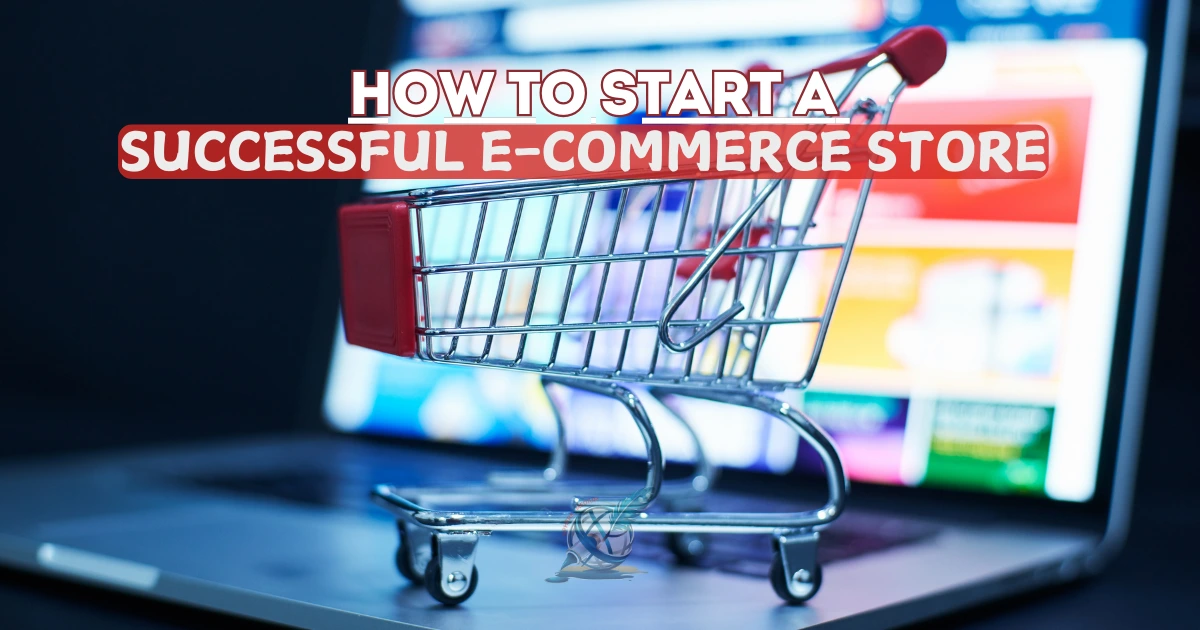How to Start a Successful E-Commerce Store: Tips and Tools
Opening an online store is an exciting business idea that could bring you a lot of money and lots of personal satisfaction. But if you want to achieve, you need to plan carefully, act wisely, and use good tools. You can make a great online store by following this complete guide. It is going to walk you through each stage and provide you with some helpful recommendations.
At Sphere Medium, we bring you expert insights and practical guides like this one to help you launch a successful e-commerce store and achieve your business dreams.
Understanding E-Commerce
There is a term known as electronic trade, or simply e-commerce, that describes the process of buying and selling items over the internet. The way in which agencies operate has been altered, and business owners have been provided with new ways to communicate with people all over the world. Learn the ins and outs of e-commerce before you can create a successful online storefront for your business.

Market Research and Niche Selection
It is imperative to collect substantial market intelligence prior to launching your internet store. Identify a market that allows your abilities and hobbies to excel. Concentrating on a certain market increases the likelihood of success for your niche firm. This will also weaken your competitiveness.
Tips for Market Research:
Identify Trends: Find Out Which Products Are Popular, Use tools like Google Trends and social media sites to learn about what products are popular and what customers want.
Analyze Competitors: Do an analysis of your competitors, Look at your rivals and figure out what they do well and what they need work on. One thing you should do is look for holes in the market that you can fill.
Survey Potential Customers: Getting information from possible customers, You can quickly get information from the people in your target market by using mindfulness companies or sending out polls.
Business Plan Development
An e-commerce company that thrives starts from a well-written business plan. It enumerates your company’s objectives, target market, sales strategy, marketing and advertising plan, and financial forecasts.

Key Components of a Business Plan:
An executive summary is a synopsis of your business and objectives.
Market Analysis: Detailed analysis of your marketplace and competitors.
Organizational Structure: Description of your business’s organizational structure.
Products and Services: Detailed description of the goods or services you may offer.
Marketing Plan: Strategies for attracting and retaining clients.
Financial Plan: Budget, funding requirements, and economic projections.
Choosing the Right E-trade Platform
The e-commerce platform you decide upon will determine the performance of your online store. The platform you choose will determine the features, capacity to grow, and simplicity of use of your store.
Popular E-Commerce Platforms:
Shopify: For small teams and amateurs, Shopify is perfect since it boasts a large app shop and a simple UI.
WooCommerce is a WordPress tool that lets you make changes and be flexible, making it good for businesses with specific needs.
BigCommerce has many features built in and is known for being able to grow with your business, making it ideal for companies that are expanding.
Magento is a good tool for bigger businesses with more complicated needs.
Selecting the proper e-commerce platform is important to the success of your on-line save. The platform you pick out will decide the capability, scalability, and ease of use of your store.
Building Your E-Commerce Website
Your internet site is the face of your e-commerce shop. It has to be visually appealing, smooth to navigate, and optimized for conversions.
Tips for Building an E-trade Website:
Choose a Professional Theme: Use a expert and responsive subject matter that aligns with your logo.
Optimize for Mobile: Make your page mobile friendly. Make sure your website is suitable with mobile devices since many customers that visit your online store will be utilizing them.
High-Quality Images: Good quality images and product descriptions can help you to draw in and keep consumers.
User-Friendly Navigation: Logical organization of your website will help users to easily obtain the products and information they need.
Fast Loading Speed: Make sure your website loads quickly if you wish to enhance user experience and lower the total number of people that abandon it right away.
Product Sourcing and Inventory Management
Running a profitable e-commerce company depends on finding trustworthy vendors and maintaining decent shape of your products.
Tips for Product Sourcing:
Wholesalers and Manufacturers: Work with informed manufacturers and distributors to ensure a product is dependable and of highest quality.
Dropshipping: You could want to investigate dropshipping if you wish to reduce stock expenses and hazards. This approach allows you to sell items without maintaining inventory.
Private labeling allows you to create your own branded products, therefore enhancing your profit margins and image.
Inventory Management Tools:
Trade Gecko: A complete inventory management device that facilitates you song stock stages, manipulate orders, and forecast call for.
ShipBob: A success carrier that handles warehousing, packing, and transport, permitting you to cognizance on growing your commercial enterprise.
Skubana: An all-in-one stock control answer that integrates with numerous e-commerce structures.
Marketing and Promotion Strategies
Effective advertising is important to force visitors on your e-trade shop and convert site visitors into customers.
Tips for E-Commerce Marketing:
Search Engine Optimization (search engine marketing): Refine your website to align with search engines such as Google in order to improve organic traffic. Incorporate relevant key phrases, including “e-commerce,” throughout your website.
Content Marketing: Develop valuable content, including blog posts, videos, and infographics, to engage and captivate your target audience.
Utilize social media platforms to effectively promote your products and engage with prospective customers.
Email Marketing: Develop a comprehensive electronic mailing list and dispatch tailored emails to cultivate leads and retain customers.
Pay-Per-Click Advertising (PPC): Employ PPC advertising to attract targeted visitors to your e-commerce platform.
Customer Service and Support
To acquire the trust and respect of your customers, you must provide service that goes above and beyond what is expected of you.
Tips for Customer Service:
Support with Live Chat: Give assistance to consumers in real time by using live chat support.
Detailed FAQs: You should create a detailed FAQ section in order to provide answers to the questions that your customers ask you the most frequently.
Refunds and Returns Made Easy: In order to make your consumers more satisfied, you should make it simple for them to return things and receive their money back.
Responsive Communication: The best way to respond to consumers is to answer their questions in a prompt and courteous manner whenever they ask you a question.
Analytics and Performance Tracking
Maintaining a close check on the performance of your electronic trade save is essential in order to identify areas in which it may be improved and to arrive at judgments that are founded on facts.
Tools for Analytics and Tracking:
Using Google Analytics, you can monitor how people interact with your website, the number of people who visit it, and the percentage of those visitors who actually make a purchase.
Hotjar: Session records and heatmaps are two tools that Hotjar recommends using to analyze how clients behave.
Klaviyo is a platform for email advertising that provides you with reliable data as well as choices for subdividing your audience.
Data from Shopify: If you use Shopify, you can utilize its data to determine how much money you generate, how many people visit your website, and how your customers behave through their interactions with your business.
Scaling Your Successful E-Commerce Store
When you have your online store up and running, you should concentrate on growing your business so that you may increase the number of sales you generate and obtain a larger portion of the market.

Tips for Scaling:
Expand Product Line: When you want to reach a greater number of individuals, you should consider adding new goods or types to your product range.
Enter New Markets: If you want to reach a greater number of individuals, you should consider expanding your business to a worldwide level.
Automate Business Processes: Utilize tools for automation to make things function more efficiently and without interruption.
Collaborate with Influencers: If you want to increase the number of people you reach and the number of sales you make, you should collaborate with influential people.
Conclusion
You need to establish a plan in advance, acquire the appropriate tools, and employ strategies that are successful in order to make an e-commerce firm lucrative. By adhering to the recommendations contained in this guide, you will be able to make your online store successful and distinguish yourself in a competitive market. Always keep in mind that the most important factor in achieving long-term success in the fast-paced world of e-commerce is to constantly study and imitate the actions of other people.
FAQs
What are the key resources required to launch an online store?
A payment gateway like PayPal or Stripe, an e-commerce platform like Shopify or WooCommerce, inventory management software like TradeGecko, and marketing tools like Google Analytics and Mailchimp are all necessary.
Item #2
Item #3
Add Your Heading Text Here
Lorem ipsum dolor sit amet, consectetur adipiscing elit. Ut elit tellus, luctus nec ullamcorper mattis, pulvinar dapibus leo.
Expert Graphic Designer | Social Media Marketing Strategist | Content Writer
Specialize in impactful visuals, strategic social media campaigns, and SEO-optimized content.


